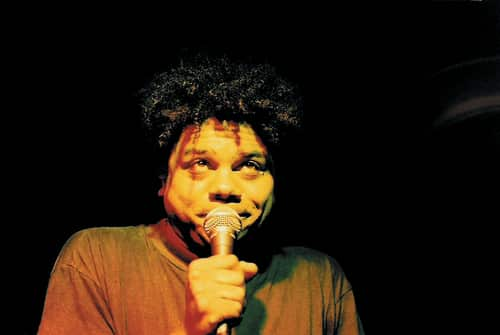A former immigration detainee has joined spoken word performers reading in more than 15 languages in the 2016 Australian Multilingual Poetry Slam competition, held in Sydney last Saturday.
All the poems featured themes of culture clash, either inspired by each poet's experiences as a mixed-race Australian, as a new immigrant, or as a refugee in Australian detention centres. The event focused on themes within the migrant and refugee experience.
Creative Director of (the organisation behind the Multilingual Poetry Slam), Miles Merrill, told SBS he started this event in the hope more communities could celebrate their native languages, and not feel pressured to give them up in a bid to assimilate with Western culture.
"I hope that one's native language never be associated with low self-esteem, but be seen as a valuable asset," Merrill said.
The night began with randomly selected members of the audience reading five poems aloud in English, each written by refugees in Australian detention. The themes of these poems were confronting and included recounts of rape, physical abuse, and other trauma, setting the tone for the evening.
One performer, Hani Abdile, a refugee from Somalia, shared a poem she had written for her trauma psychologist while on detention on Christmas Island. In her poem, Abdile shared her perspective on asylum seeking in a way local Australians could understand:
"You wouldn’t want to leave Sydney, because Sydney is cool. That’s how I felt about my home. But I had to leave. They made me,” she said, between verses.
Abdile spent 13 months in detention, but now works as a consultant for the Department of Immigration. She also runs the refugee creative writing program, .
Another poet, Sandip Bhattacharjee, recited a poem in his native Bengali about the 2013 Blue Mountains bushfires. His poem was told from the perspective of small bush plants burning within the flames, which he found mirrored the migrant experience.
"I found the experiences of these plants burning, the fire, was an analogy for new migrants struggling in a new land," he told SBS.
Translations of foreign language poems were projected as the poets performed, though many audience members said they didn't need them to understand what was being said.
"It almost like you don't need to know the language they're speaking to understand it. It's like music," Lucy, an audience member, said.
"It's heavy stuff. It's moving, and it transcends language," said another gentleman in the audience. Word Travels is an organisation similar to Toastmasters, but with a focus on spoken word performances and beat poetry.
Word Travels is an organisation similar to Toastmasters, but with a focus on spoken word performances and beat poetry.

Miles Merrill, Creative Director and founder of Words Travel. (Twitter) Source: Twitter
Merrill said the multilingual slam was a way to preserve languages that were becoming extinct, allowing people to better interact with their past, something he and his parents regret.
"I come from Chicago but am African, Italian, Irish and English. I know my mother feels disconnected from her past because she can't speak or understand Italian let alone the Napoli dialect. My father's family were slaves so they are even more removed from their origins.
"This disconnect is something I inherited. I mourn the loss of access to my past," he said.
The slam featured poems performed in English, Spanish, Bengali, Filipino, Kurdish, Maori and several other tongues, but most of the poems on the night were performed in English, or peppered with foreign phrases.
The poets were of all different ages - university students to senior citizens.
The Multilingual Poetry Slam presented itself as a grassroots community-centric event, unlike the annual Australian Poetry Slam (also run by Word Travels), held in the Opera House and sponsored by large organisations like Sydney Writers Festival and Australian Council for the Arts.
This year marks the event's fourth year running; until this year the Multilingual Poetry Slam was funded by the City of Sydney. But spaces like Sydney Dance Lounge have been kind to Word Travels, said Merrill.
The event was hosted by last year's Australian Poetry Slam champion, Zohab Zee Khan, who said Word Travels events "provide a platform for expression and a place to share your stories". He MC'd the event in both English and Urdu, slipping into both languages at will.
The winner, Bhupen Thakkar, was selected by randomly selected judges in the audience. His poem was performed in English, with small a capella flourishes of Indian music throughout.

